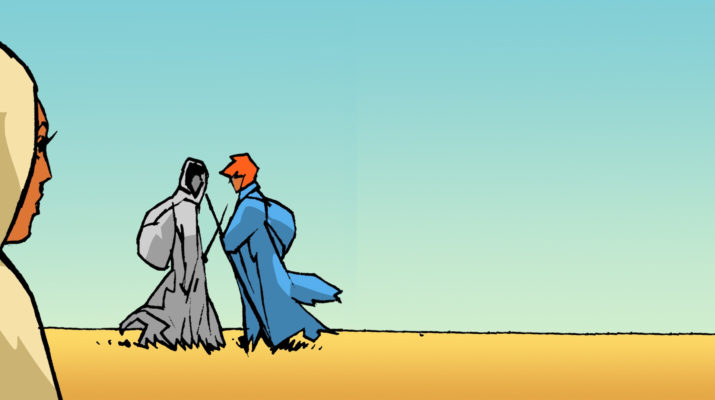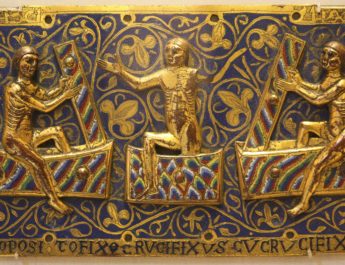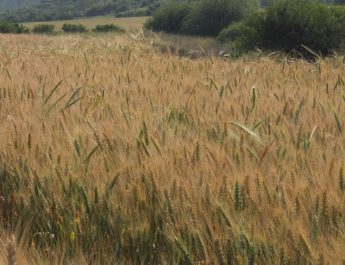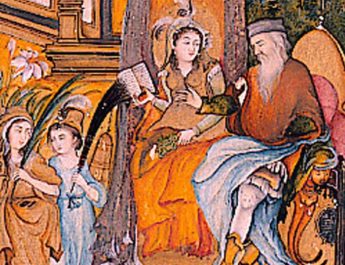Numbers 36
BibleHub
1 The headsA of the ancestralB houses of the clansC
Notes on verse 1a
A “heads” = rosh. This may come a word that means to shake. It is the head, captain, or chief. It can also be excellent or the forefront. It can be first in position or in statue or in time (i.e. the beginning).
B “ancestral” = ab. This is father, chief, or ancestor. It is father in a literal or figurative sense.
C “clans” = mishpachah. From the same as shiphcah (maid, maidservant); root means to spread out. This is one’s circle of relatives – clan, family, kindred.
of the descendantsD of GileadE sonF of MachirG
Notes on verse 1b
D “descendants” = ben. From banah (to build or obtain children). This is son, age, child. It is son in a literal or figurative sense.
E “Gilead” = Gilad. From gala (to lay bare, quarrel, expose) OR from gal’ed (heap of testimony); {from gal (wave, billow, rock pile; something rolled; a spring of water); {from galal (to roll, roll away, wallow, commit, remove; rolling in a literal or figurative sense)} + ed (witness, testimony, recorder); from ud (to admonish, repeat, duplicate, testify, restore, record, relieve)}}. This is Gilead, meaning “perpetual fountain” or “heap of testimony.” See https://www.abarim-publications.com/Meaning/Gilead.html#.Xw_EFShKhPY.
F “son” = ben. Same as “descendants” in v1. See note D above.
G “Machir” = Makir. From makar (to sell – could be commerce/trade, a daughter to be married, someone into slavery; figuratively, to surrender). This is Machir or Makir, it is a name meaning “salesman.”
son of Manasseh,H of the JosephiteI clans, came forwardJ and spokeK in the presence ofL
Notes on verse 1c
H “Manasseh” = Menashsheh. From nashah (to forget, neglect, remove, deprive). This is Manasseh, literally “causing to forget.” It is Manasseh, his tribe, or the lands of the tribe.
I “Josephite” = ben + Yoseph. Literally, “children of Joseph.” Ben is the same as “descendants” in v1. See note D above. Yoseph is from yasaph (to add, increase, continue, exceed). This is Joseph, meaning “he increases” or “let him add.”
J “came forward” = qarab. This is to come near, offer, make ready, approach, take.
K “spoke” = dabar. This is generally to speak, answer, declare, or command. It might mean to arrange and so to speak in a figurative sense as arranging words.
L “in the presence of” = paneh. From panah (to turn, face, appear). This is face in a literal or figurative sense. It could be face, presence, anger, respect. It can also be used of God to indicate divine favor or presence.
MosesM andN the leaders,O the heads of the ancestral houses of the Israelites;P
Notes on verse 1d
M “Moses” = Mosheh. From mashah (to pull out in a literal or figurative sense, to draw out) OR from Egyptian mes or mesu (child, son i.e. child of…). This is Moses – the one drawn out from the water, which is to say, rescued. If derived from the Egyptian, his name would share a root with Rameses and Thutmose.
N {untranslated} = paneh. Same as “in the presence of in v1. See note XII above.
O “leaders” = nasi. From nasa (to lift in a broad sense, literally and figuratively; to carry, take, or arise; to bring forth, advance, accept). This is one lifted up or exalter. So, it could be prince, chief, ruler, captain, king, or vapor.
P “Israelites” = ben + Yisrael. Literally, “children of Israel.” Ben is the same as “descendants” in v1. See note D above. Yisrael is from sarah (to persist, exert oneself, contend, persevere, wrestle, prevail) + El (God or god). This is Israel, meaning God strives or one who strives with God; new name for Jacob and for his offspring. This refers to the people and to the land.
2 they said, “The LordQ commandedR my lordS to giveT
Notes on verse 2a
Q “Lord” = YHVH. From havah (to be, become) or hayah (to come to pass, become, be). This is the name of the God of Israel, the self-existent and eternal one, the tetragrammaton. This pronunciation has been lost to time so “Lord” is generally used in its place.
R “commanded” = tsavah. This is to charge, command, order, appoint, or enjoin. This is the root that the Hebrew word for “commandment” comes from (mitsvah).
S “lord” = adon. From a root that means ruling or being sovereign. This is lord, master, or owner.
T “give” = natan. This is to give, put, set, offer. It is to give literally or figuratively.f
the landU for inheritanceV by lotW to the Israelites, and my lordX was commanded by the LordY
Notes on verse 2b
U “land” = erets. Root may mean to be firm. This is earth, ground, field land, or country.
V “inheritance” = nachalah. Related to nachal (to inherit, occupy, distribute, take as heritage). This is properly something that was inherited. It can mean occupancy generally or, more particularly, an heirloom or an estate. This can be an inheritance, gift, possession, or portion.
W “lot” = goral. Root may mean to be rough like a stone. A lot was probably a small pebble used to determine one’s portion or what one should do (the will of a god or one’s destiny).
X “lord” = adon. Same as “lord” in v2. See note S above.
Y “Lord” = YHVH. Same as “Lord” in v2. See note Q above.
to give the inheritance of our brotherZ ZelophehadAA to his daughters.BB
Notes on verse 2c
Z “brother” = ach. This is brother, kindred, another, other, like. It is literally brother, but it can also be someone who is similar, resembling, or related to.
AA “Zelophehad” = Tselophchad. 11x in OT. Perhaps from the same as Tsalaph (Tsalaph or Zalaph; perhaps meaning “caper-plant” or “fracture”) + echad (number one, first, united; alone, altogether, a certain, a few); {from achad (to unify, continue on a path; figuratively, to gather one’s thoughts)} OR from tsel (shade in a literal or figurative sense; shadow, shade, protection, shelter, or defense); {from tsalal (to be or become dark, shade; this is the shade as during twilight or shadow as associated with something opaque)} + pachad (to dread, be afraid, thrill, be in awe; feeling startled from a sudden sound or alarm). This is Zelophehad or Tselophchad, meaning “first rupture” or “firstborn” or “shadow of the fear” See https://www.abarim-publications.com/Meaning/Zelophehad.html & https://www.abarim-publications.com/Meaning/Zalaph.html
BB “daughters” = bat. Related to “descendants” in v1. From ben (see note D above). This is daughter in a literal or figurative sense.
3 But if theyCC are marriedDD into anotherEE, FF Israelite tribe,GG
Notes on verse 3a
CC “they” = ishshah. From ish (man); perhaps from enosh (human, humankind, mortal); from anash (to be weak, sick, or frail). This is woman, wife, or female.
DD “are married” = hayah. Related to “Lord” in v2. See note Q above.
EE “another” = echad. Related to “Zelophehad” in v2. See note AA above.
FF {untranslated} = ben. Same as “descendants” in v1. See note D above.
GG “tribe” = shebet. This is a rod, staff, club, scepter, dart, or tribe. Literally a stick that can be used for punishing, writing, fighting, walking, ruling; thus, used figuratively for a clan.
then their inheritance will be takenHH from the inheritance of our ancestors and addedII to the inheritance of the tribeJJ into which they marry, so it will be taken awayKK from the allotted portionLL of our inheritance.
Notes on verse 3b
HH “taken” = gara. This is to remove, restrain, cut off, take away, shave, limit.
II “added” = yasaph. Related to “Josephite” in v1. See note I above.
JJ “tribe” = matteh. From natah (to stretch or spread out, extend, bend). This is a staff, rod, branch, or tribe. It could be a rod for discipline or correction. It could be a scepter to indicate authority, a throwing lance, or a walking staff. Figuratively, it could also be something that supports life (like bread).
KK “taken away” = gara. Same as “taken” in v3. See note HH above.
LL “allotted portion” = goral. Same as “lot” in v2. See note W above.
4 And when the JubileeMM of the Israelites comes,NN then their inheritance will be added to the inheritance of the tribeOO into which they have married, and their inheritance will be taken from the inheritance of our ancestral tribe.”PP
Notes on verse 4
MM “Jubilee” = Yobel. From yabal (to bring, carry, flow, lead forth). This is a horn – whether a ram’s horn or a silver trumpet. It can also refer to the jubilee or the beginning of a festival.
NN “comes” = hayah. Same as “are married” in v3. See note DD above.
OO “tribe” = matteh. Same as “tribe” in v3. See note JJ above.
PP “tribe” = matteh. Same as “tribe” in v3. See note JJ above.
5 Then Moses commanded the Israelites according to the wordQQ of the Lord,RR saying, “The descendants of the tribeSS of Joseph are rightTT in what they are saying.UU
Notes on verse 5
QQ “word” = peh. This is mouth in a literal or figurative sense. So, more literally, it can be beak or jaws. More figuratively, it refers to speech, commands, or promises.
RR “Lord” = YHVH. Same as “Lord” in v2. See note Q above.
SS “tribe” = matteh. Same as “tribe” in v3. See note JJ above.
TT “right” = ken. Perhaps from kun (properly, in a perpendicular position; literally, to establish, fix, fasten, prepare; figuratively, it is certainty, to be firm, faithfulness, render sure or prosperous). This is to set upright. Generally used figuratively to mean thus, so, afterwards, rightly so.
UU “saying” = dabar. Same as “spoke” in v1. See note K above.
6 This is whatVV the LordWW commands concerning the daughters of Zelophehad, saying: Let themXX marry whom they think best;YY
Notes on verse 6a
VV “what” = dabar. Related to “spoke” in v1. From dabar (see note K above). This is speech, a word, a matter, an affair, charge, command, message, promise, purpose, report, request. It is a word, which implies things that are spoken of in a wide sense.
WW “Lord” = YHVH. Same as “Lord” in v2. See note Q above.
XX “them” = ishshah. Same as “they” in v3. See note CC above.
YY “think best” = tob + ayin + hayah. Literally, “is good in their eyes.” Tob is from tob (to be pleasing, to be good). This is good, beautiful, pleasant, agreeable, bountiful, at ease. This word is used for goodness as a concept, a good thing, a good person. This can refer to prosperity and welfare as well as joy, kindness, sweetness, and graciousness. So, this is ethically good, but also enjoyably good. Ayin is eye in a literal or figurative sense so eye, appearance, favor, or a fountain (the eye of the landscape). Hayah is the same as “are married” in v3. See note DD above.
onlyZZ it must be into a clan of their father’sAAA tribeBBB that they are married,CCC
Notes on verse 6b
ZZ “only” = ak. Related to “right” in v5. Related to aken (surely, truly, nevertheless); from kun (see note TT above). This is a positive statement – surely, also, certainly, alone, only.
AAA “father’s” = ab. Same as “ancestral” in v1. See note B above.
BBB “tribe” = matteh. Same as “tribe” in v3. See note JJ above.
CCC “are married” = hayah + ishshah. Literally, “become wives.” Hayah is the same as “are married” in v3. See note DD above. Ishshah is the same as “they” in v3. See note CC above.
7 so that no inheritance of the Israelites shall be transferredDDD from one tribe to another,EEE for allFFF Israelites shall retainGGG the inheritance of their ancestral tribes.HHH
Notes on verse 7
DDD “transferred” = sabab. This is turning around, going around; to surround, cast, walk, fetch. It is to revolve or border in a literal or figurative sense.
EEE “from one tribe to another” = matteh + el + matteh. Literally, “from tribe to tribe.” Matteh is the same as “tribe” in v3. See note JJ above.
FFF “all” = ish. Related to “they” in v3. See note CC above.
GGG “retain” = dabaq. This is to follow closely or abide fast, to cling or be joined together. Figuratively, it can mean to catch something by chasing after it, to overtake, or to stick. A man clings to his wife in Genesis 2:24, Shechem was deeply attracted to Dinah in Genesis 34:3, Ruth clung to Naomi in Ruth 1:14, Solomon clung to his foreign wives and concubines in 1 Kings 11:2. It is also used of a tongue sticking to the mouth, pursuing or overtaking as in battle, and also clinging to God.
HHH “tribes” = matteh. Same as “tribe” in v3. See note JJ above.
8 EveryIII daughter who possessesJJJ an inheritance in any tribeKKK of the Israelites shall marry oneLLL
Notes on verse 8a
III “every” = kol. From kalal (to complete). This is all or every.
JJJ “possesses” = yarash. This is inheriting or dispossessing. It refers to occupying or colonizing – taking territory by driving out the previous inhabitants and living there instead of them. By implication, it can mean to seize or rob, to expel, ruin, or impoverish.
KKK “tribe” = matteh. Same as “tribe” in v3. See note JJ above.
LLL “one” = echad. Same as “another” in v3. See note EE above.
from the clan of her father’s tribe,MMM so that all Israelites may continue to possess their ancestral inheritance. 9 No inheritance shall be transferred from one tribe to another,NNN for eachOOO of the tribesPPP of the Israelites shall retain its own inheritance.”
Notes on verses 8b-9
MMM “tribe” = matteh. Same as “tribe” in v3. See note JJ above.
NNN “from one tribe to another” = matteh + matteh + acher. Matteh is the same as “tribe” in v3. See note JJ above. Acher is from achar (to be behind, delay, be late, procrastinate, continue). This is following, next, strange, other.
OOO “each” = ish. Same as “all” in v7. See note FFF above.
PPP “tribes” = matteh. Same as “tribe” in v3. See note JJ above.
10 The daughters of ZelophehadQQQ didRRR as the LordSSS had commanded Moses.
Notes on verse 10
QQQ {untranslated} = ken. Same as “right” in v5. See note TT above.
RRR “did” = asah. This is to make, do, act, appoint, become in many senses.
SSS “Lord” = YHVH. Related to “Lord” in v2 & “are married” in v3. From the same as YHVH (see note Q above). It has a different vowel pointing, but the same meaning as “Lord.”
11 Mahlah,TTT Tirzah,UUU Hoglah,VVV
Notes on verse 11a
TTT “Mahlah” = Machlah. 5x in OT. Perhaps from chalah (to be worn; hence, being weak, sick, or afflicted; to grieve or, positively, to flatter or entreat). This is Mahlah or Machlah, meaning “sickness” or “disease” or “entreaty.” See https://www.abarim-publications.com/Meaning/Mahlah.html
UUU “Tirzah” = Tirtsah. 18x in OT. From ratsah (to be pleased with, delight, take pleasure in, or accept with favor; to approve or consent regarding something; can be used specifically of satisfying debts or being pardoned). This is Tirzah or Tirtsah, meaning “delight” or “pleasantness” or “pleasure” or “beauty.” See https://www.abarim-publications.com/Meaning/Tirzah.html
VVV “Hoglah” = Choglah. 4x in OT. Perhaps from chagal (to wobble, hop). This is Hoglah or Choglah, perhaps meaning “partridge.” See https://www.abarim-publications.com/Meaning/Hoglah.html
Milcah,WWW and Noah,XXX the daughters of Zelophehad, married sons of their father’s brothers.YYY 12 They were married into the clans of the descendants of Manasseh son of Joseph, and their inheritance remainedZZZ in the tribeAAAA of their father’s clan.
Notes on verses 11b-12
WWW “Milcah” = Milchah. 11x in OT. From malkah (queen); from melek (king, royal). This is Milcah or Milkah, meaning “queen.”
XXX “Noah” = Noah. 4x in OT. From nua (to waver in a literal or figurative sense; to tremble, quiver, totter; a fugitive). This is Noah, meaning “movement” or “shaky girl” or “lady wanderer.” See https://www.abarim-publications.com/Meaning/Noah.html
YYY “father’s brothers” = dod. This may come from a word that means to boil. It is love or lover. It can also refer to one who is beloved, like an uncle, or a love-token.
ZZZ “remained” = hayah. Same as “are married” in v3. See note DD above.
AAAA “tribe” = matteh. Same as “tribe” in v3. See note JJ above.
13 These are the commandmentsBBBB and the ordinancesCCCC that the LordDDDD commanded throughEEEE Moses
Notes on verse 13a
BBBB “commandments” = mitsvah. Related to “commanded” in v2.
CCCC “ordinances” = mishpat. From tsavah (see note R above). This is a commandment, law, ordinance obligation, or tradition. It is something commanded whether by God or by a human authority. This term is sometimes used collectively to refer to the Law.
DDDD “Lord” = YHVH. Same as “Lord” in v2. See note Q above.
EEEE “through” = yad. This is hand, ability, power. Hand in a literal sense, but also what one can do or the means by which one does it.
to the Israelites in the plainsFFFF of MoabGGGG by the JordanHHHH opposite Jericho.IIII
Notes on verse 13b
FFFF “plains” = arabah. From the same as arab (desert plateau, Arabia) OR from arab (to become evening); {from ereb (evening) or from arab (to exchange, give or take on pledge, braid, intermix)}. This is a desert valley or plain, wilderness. Also, the name of a place Arabah.
GGGG “Moab” = Moab. Related to “ancestral” in v1. May be from ab (see note B above). This is Moab or Moabite. Name could mean “from her father” in reference to the incestuous relationship between Lot and his daughters. The name could also mean, more pleasantly, “seed of a father” or “desirable land.” See https://en.wikipedia.org/wiki/Moab
HHHH “Jordan” = Yarden. From yarad (to go down, descend; going down in a literal or figurative sense; going to the shore or a boundary, bringing down an enemy). This is the Jordan River, meaning “descending.”
IIII “Jericho” = Yericho. From yareach (moon); {from the same as yerach (month)} OR from ruach (smell, breathe, perceive, anticipate, accept, enjoy). This is Jericho meaning either “moon city” or “fragrant place.”
Image credit: “Ruth – the Outsider” by Jeff Anderson, Siku, and Richard Thomas of Edge Group – Lion Hudson, 2015.




